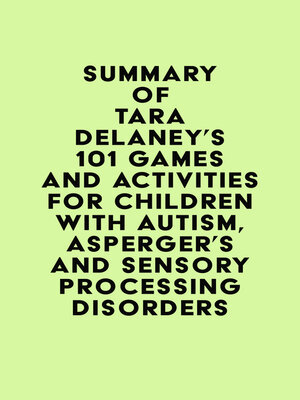Summary of Tara Delaney's 101 Games and Activities for Children With Autism, Asperger's and Sensory Processing Disorders
ebook
By IRB Media

Sign up to save your library
With an OverDrive account, you can save your favorite libraries for at-a-glance information about availability. Find out more about OverDrive accounts.
Find this title in Libby, the library reading app by OverDrive.



Search for a digital library with this title
Title found at these libraries:
| Loading... |
Please note: This is a companion version & not the original book. Book Preview:
#1 Play is often said to be difficult for children with neurological difficulties, especially autism, Asperger's syndrome, and sensory processing disorder. However, when these children are taught effective ways to engage with objects and people, they have fun.
#2 The games and activities in this book are designed to increase a child's engagement in the world around him or her. When a child doesn't appear to register what we say or do, or appears to register it in a negative or fearful way, the natural reaction is to pull back and give less.
#3 When interacting with any children, including those with neurological difficulties, we must assume that they are connecting to us and getting something from the interaction even if it doesn't seem like they are.
#4 To be motivated to participate in an activity, the child must perceive it as being fun. If the activity is too complicated or long, many children will not engage. To be motivated, they need to perceive activities as being fun.






